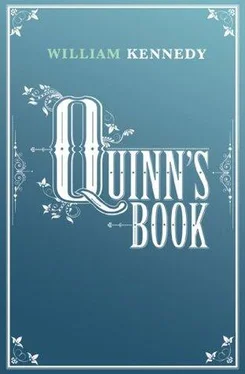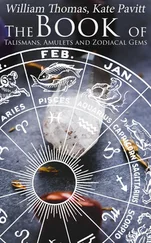Maud looked down at Quinn and saw neither the boy nor the young man (however briefly met) that she once knew. She saw a pacific smile and knew she was the cause of it, but saw, too, the trouble that lay behind it, had noted that trouble the instant she saw him in front of the mansion. It was the war, of course, and so she would begin with Keats, telling Quinn that he was perhaps half in love with easeful death.
“Thou wast not born for death,” she read, and eyed Quinn secretly, finding his smile gone, his face at full attention. Her geis was functioning. He was in the spell of her suggestion about the kidnapping. When they talked later she would invite him to Saratoga as her and Gordon’s guest. And once there. . and once there. .?
She opened her second book and told the audience she had not publicly read this poem before this moment, and then began:
O, young Lochinvar is come out of the west
Through all the wide Border his steed was the best;
And save his good broadsword, he weapons had none ,
He rode all unarmed and he rode all alone.
So faithful in love, and so dauntless in war ,
There never was knight like the young Lochinvar. .
But ere he alighted at Netherby gate ,
The bride had consented, the gallant came late :
For a laggard in love, and a dastard in war ,
Was to wed the fair Ellen of brave Lochinvar.
Maud read with great verve and sensitivity the next four stanzas, banishing male beamings and female scowls and replacing both with rapt attentiveness to the narrative, wherein Lochinvar avows to the bride’s father that he has come only to drink one cup of wine with the bride denied him and, when it is drunk, to have but a single dance with fair Ellen. And they do dance, as parents and bridegroom fume, and as bridemaidens watch approvingly. Then does Lochinvar assert himself:
One touch to her hand, and one word in her ear ,
When they reached the hall-door, and the charger stood near;
So light to the croupe the fair lady he swung ,
So light to the saddle before her he sprung!
“She is won! we are gone, over bank, bush, and scaur;
They’ll have fleet steeds that follow,” quoth young Lochinvar.
There was mounting ’mong Graemes of the Netherby clan;
Forsters, Fenwicks, and Musgraves, they rode and they ran;
There was racing and chasing, on Cannobie Lee ,
But the lost bride of Netherby ne’er did they see.
So daring in love, and so dauntless in war.
Have ye e’er heard of gallant like young Lochinvar?
Maud descended the stairs to stout applause, perceiving with pleasure that Quinn’s was the stoutest of all.
“Will Canaday has suggested I talk of the war’s reality,” Quinn said to the audience. “These cannon here look like reality to me. . and these flags all full of holes. And those things over there in the Curiosity Shop made by rebel prisoners at Point Lookout: rubber buttons turned into rings, and carved with the word ‘Dixie.’ You could walk right over there now and buy a rebel button and that might qualify as reality. Albany boys in rebel prisons down in Carolina and Alabama are making things too, carving pictures of Abe Lincoln and the flag out of kindling so the rebs can buy them and pitch them in the fire.
“Reality in this war is not always what you think it is. Take the fight at Round Top, when the Forty-fourth from Albany was part of the brigade trying to take that hill. Just a hill like a lot of others in this world, but ten thousand of our men went after it, and only twelve hundred came out alive. A pile of dead people, that’s the reality I’m talking about. The bigger the pile, the bigger the reality. We did get that hill before the rebs, and that’s reality too. A lot of hand-to-hand fighting. When it looked like our boys might get their tails whipped, our batteries opened up and dropped a whole lot of cannon shot on top of everybody — the point, of course, being to stop the rebs. Fact that our boys were mixin’ it up with the rebs wasn’t all that important, and so they got themselves killed by their own cannons. Reality.
“Then there was the major that the general wanted to see but nobody could find him. This major, he was from Buffalo. He was one nice fella, and I knew just how good a soldier he was. The best. We didn’t want him to get into trouble, so we all went out looking for him. I found him under a bridge, having what some folks like to call carnal relations — with a brown chicken. That may not seem like it, but that’s reality.”
Several women exchanged glances at this remark, rose instantly from their seats, and left the gathering. Men snickered at one another and some squirmed. Quinn fell into a natural pacing up and down the platform as he talked, unintimidated by the task for which he claimed to be so ill suited.
“This reb from Texas,” he went on, “when our boys got him in their sights at Round Top he called out to them, ‘Don’t shoot me,’ and threw down his rifle. Soon as he did, one of his fellow Texans shot him in the back. Reality coming up from behind.
“And the attack at Cold Harbor, where seven thousand of our boys died in eight minutes trying to break through Lee’s line. Couldn’t do it. Our dead boys were spread shoulder-to-shoulder over about five acres. You could hardly find any grass wasn’t covered by a dead soldier. That was unnatural reality down at Cold Harbor.
“I remember a letter I helped a young boy from the Forty-fourth write. He wrote what an awful mistake other boys back home had made by not joining up with the glory of the Forty-fourth. He died of inflammation of the brain, somewhere in Virginia. There was also a measles epidemic that killed a bunch of our lads before they ever had a chance to get themselves killed by reb muskets. Sort of a reductive reality, you might call that.
“Then there was this close friend of mine from Albany who was a captain, and we used to talk about things that were real and things that weren’t, though we never put it quite that way, and one day I heard he got shot three times in less than a minute. Shot sitting down and so he stood up, and before he could fall over he got shot again, and then on the way down they got him again, and he didn’t die. Still kickin’ after twenty-three battles, and that’s one of the nicer realities I ever heard of in this war.
“I got my own reality the day I was hit by a spent reb cannonball. Just touched by it, really, and it wasn’t moving very fast. But it knocked me down, broke my leg and made me bleed, and I thought maybe I’d die alone there on the battlefield. I couldn’t even give a good explanation of why I was hit. The battle was long over and I wasn’t a soldier. I was just out there looking for survivors and some reb cannoneer maybe figured, why not wipe out that Yankee bastard? He let one go I never paid any attention to, and it got me. I might be out there yet, but then along came this grayback doctor and I see him working on hurt rebs. I called out, ‘Hey, doc, can you stop my bleeding and set my leg?’ And he said, ‘I cain’t set no laigs. I got soldiers of my own dyin’ here.’ And he went on helping rebs. So I called out and said, ‘Hey, doc, I got money I can pay you if you stop my bleeding and set my leg.’ And the doc looks me over and says, ‘How much you got, son?’ and I say, ‘I got twenty-five dollars in gold I been savin’ for my retirement,’ and he says, ‘Okay, I can help you retire.’ And he comes over and looks me up and down and says, ‘Where’s the gold?’ And I fished in my money belt and showed it to him, and he smiled nice as peach pie at me and went ahead and stitched me up and put a splint on me, and then he wrapped that leg so fine I got right up and started to walk. I gave him the gold and says to him, ‘Thanks a lot, doc,’ just like he was a human being. And he says, ‘Don’t mention it, son, but don’t put too much pressure on that leg,’ just like I was a goddamned reb.”
Читать дальше












